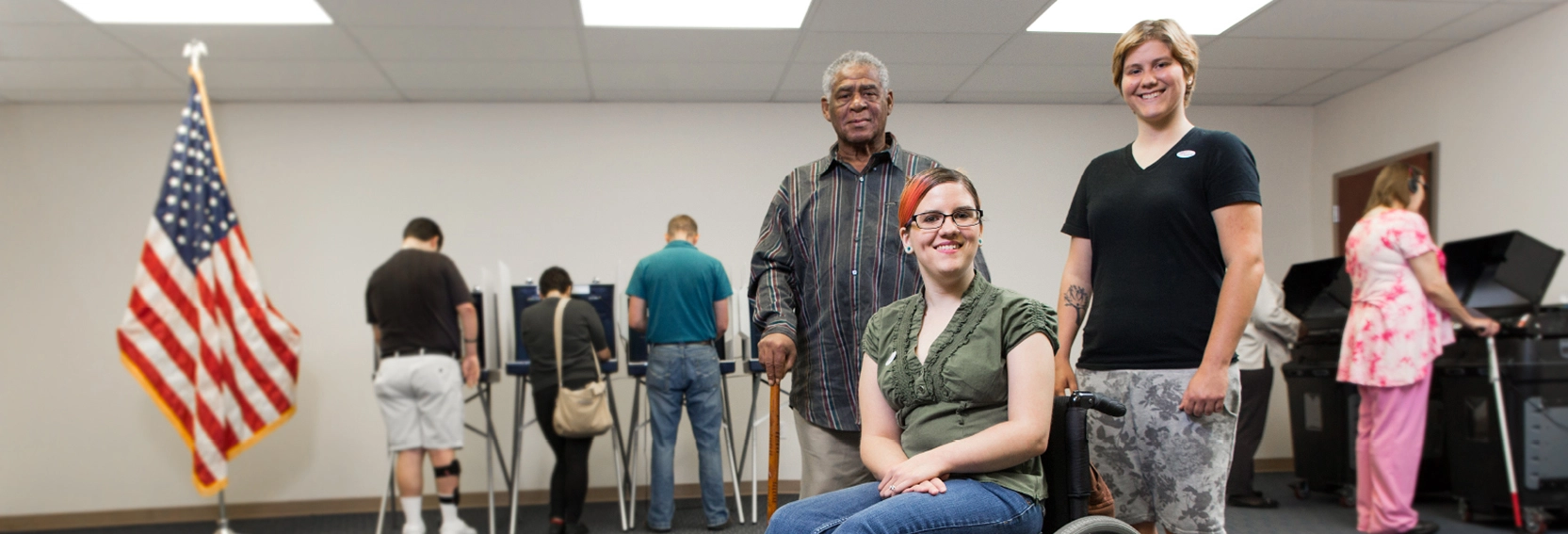Every election cycle, people advocate to remove barriers to our voting systems so they are accessible to everyone, including people with disabilities. Exercising the right to vote is a fundamental part of our nation’s democracy, so it is essential to protect and improve every voter’s access to the ballot box.
The public health crisis created by the COVID-19 global pandemic has made it even more important for election officials to understand the varied accessibility needs and preferences of voters with disabilities in the state. It is imperative that any changes or modifications proposed to state or local election administration during the COVID-19 pandemic provide voters with disabilities with equal access and the ability to cast a vote privately and independently.
Although it is difficult to know with certainty how the public health crisis will impact our state’s elections in the fall, some closure and relocation of polling places is definitely possible. There are many reasons why voters with disabilities either require or prefer to vote in-person or through vote-by-mail (VBM) balloting. Elections accessibility is not a discussion with a “one size fits all” solution, and no one should be forced to choose between exercising their right to vote versus remaining safe or healthy.
Preserving In-Person Voting Options
Efforts should be made to maintain safe and accessible in-person voting to the greatest extent possible during the global pandemic as a way of ensuring elections access for all voters, including those for whom VBM balloting is either inaccessible or fails to provide a private and independent voting opportunity. Florida should join a growing number of other states in allowing and implementing “curbside” voting, especially as a way of increasing both the safety and accessibility of in-person voting.
Where poll sites are relocated or consolidated, alternate polling locations should be close in proximity to the original site and accessible by a similar range of transit and paratransit options. Additionally, since poll site relocations are inevitable, voters should be allowed to cast their ballots at any operational polling precinct within a county. All poll sites utilized must comply with accessibility standards specified in the Americans with Disabilities Act (ADA). If an ADA-compliant location is unavailable, the United States Department of Justice recommends several same-day temporary modifications that can be made to ensure compliance during polling hours to prevent poll closure.
Especially if there are polling site relocations to residential and congregate facilities that were intended to be used as precincts, the state must provide instruction regarding how “supervised absentee voting” within these facilities will operate while also promoting awareness and understanding of the concept itself.
Enhancing Accessible Vote-By-Mail (VBM) Balloting
If there are widespread health and safety concerns related to COVID-19 in the fall, there will naturally be an increased reliance on VBM balloting. Although mail-in voting certainly helps some voters with disabilities who do not prefer to vote in-person, the paper balloting system used for vote-by-mail is not accessible for all voters and does not guarantee a private and independent voting opportunity as required by law.
Whether or not there is an increased need to rely upon VBM balloting due to public health concerns, the state should immediately certify and implement electronic ballot delivery and ballot marking technologies. Voters who cannot utilize traditional paper-based VBM balloting but who also might not be able to vote in-person on accessible voting equipment should be permitted to use assistive technology of their choosing to complete and print out their ballot.
Moreover, it is important that self-sealing, prepaid envelopes are provided to voters seeking or required to vote-by-mail during the pandemic and that the state establish additional drop-off sites for completed VBM ballots.
Other Considerations
Since there is so much that is still uncertain about how the state will ultimately adjust its election processes during the 2020 Primary and General Elections due to the COVID-19 health crisis, there exists an urgent need to provide relevant information to voters with disabilities in accessible formats. Similarly, the state should consider extending and relaxing deadlines and other requirements related to registering to vote, requesting a VBM ballot, casting a VBM ballot, and early in-person voting.
ATVFL Letter to the State (May 2020)
Following much discussion and deliberation, Access the Vote Florida drafted a letter that was sent to the Governor, Secretary of State, Director of Division of Elections and other state officials on May 28, 2020. This letter outlined many of the above considerations and was also distributed to all county supervisors of election the next month. Read our letter to the Governor and other state officials.
